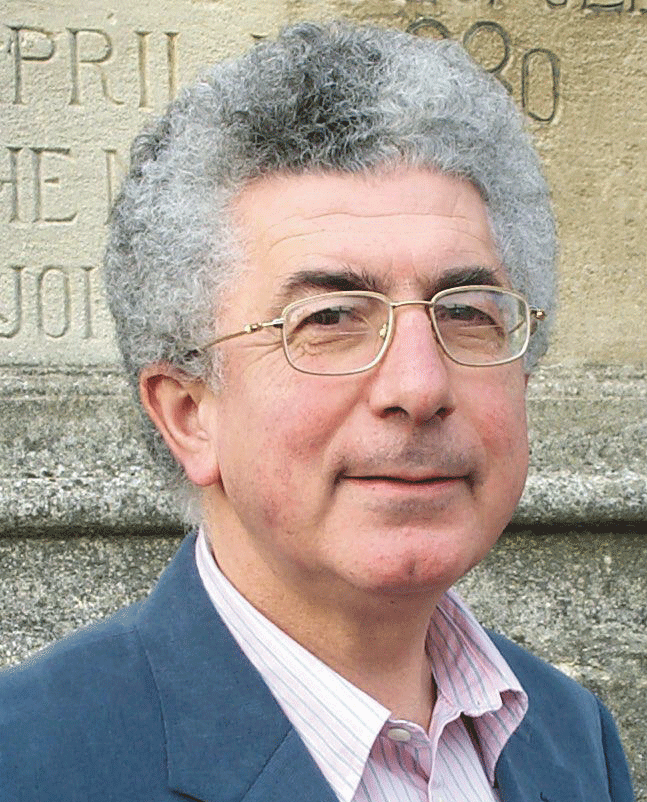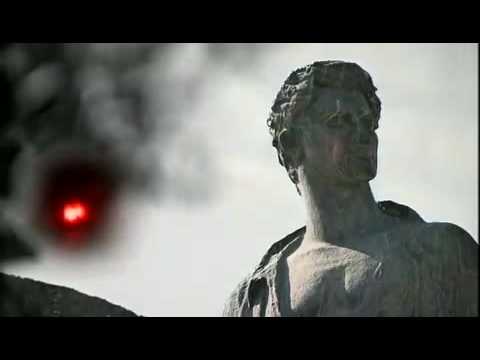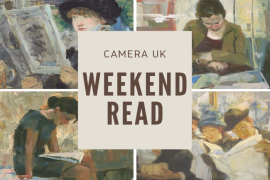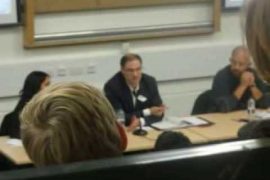In May 2008 – at the time of Israel’s 60th anniversary celebrations – the BBC’s Middle East Editor Jeremy Bowen produced a documentary entitled “The Birth of Israel” which was broadcast on BBC 2. Anyone who watched that programme then will surely not have forgotten its numerous instances of playing fast and loose with carefully selected nuggets of history – as was pointed out at the time by Honest Reporting and others.
Below is the first part of that documentary (the other parts can be seen here).
[youtube=http://www.youtube.com/watch?v=ICq9nhQxVY8]
At 05:55 Bowen says:
“In 1897 the Zionist movement in Europe met and declared that it wanted to found a state for Jews in Palestine. Two years later the Arab mayor of Jerusalem begged them to leave Palestine alone and warned there’d be an Arab uprising if they didn’t. After the meeting in 1897, two Rabbis were sent to Palestine to see what the country was like. They reported back – the bride is beautiful, but she’s married to another man”.
Bowen’s two Rabbis are nameless and he provides no factual evidence for his tale – which is designed to show that the early Zionists knowingly ran roughshod over an existing indigenous Arab population and thus to ‘prove’ the ‘original sin’ of the founding of Israel.
So where did Bowen get that story from? Here is a passage from the introduction to Avi Shlaim’s 2001 book entitled “The Iron Wall: Israel and the Arab World”.
So possibly Bowen had been reading the ‘new historian‘ anti-Israel polemicist Shlaim – the man famous for declaring that “the job of the historian is to judge”. Or perhaps his reading matter came from one-stater Ghada Karmi, who also used the same theme in her 2007 book entitled “Married to Another Man“.
What is Karmi’s source for story? Earlier this year some light was shed on that question by Shai Afsai, writing in the journal ‘Shofar‘.
“Where did Karmi get this story from? For some time, she did not respond to e-mails requesting information on her source, but in 2010 she furnished this reply: “The story’s origins has caused me problems. I got the citation from Avi Shlaim at Oxford, who gave me a reference for it, which turned out not to be correct. I then searched hard for the source and have come up with a blank. I fear it might be apocryphal, much as I had not wanted that. Sorry!” She later added that Shlaim told her “the story had appeared in a book by Muhammad Hassanein Heikal. But it was not there.” “
So Karmi’s source is Shlaim, but she cannot verify the quote attributed to the two nameless Rabbis. And what of Shlaim’s source?
“As with Karmi and Pagden, Shlaim provides no source for the “married to another man” story he tells, despite there being  twenty-one pages of notes at the back of The Iron Wall. Responding to a question about his source, Shlaim wrote in a 2009 e-mail that it was Mohamed Heikal’s Secret Channels (1996). This book is listed in Shlaim’s bibliography, along with two other works by Heikal, a prominent Egyptian journalist, author, and commentator, who was the editor-in-chief of Al-Ahram for many years, as well as an adviser to (and mouthpiece of) Egypt’s President Nasser. In Secret Channels, Heikal writes:
twenty-one pages of notes at the back of The Iron Wall. Responding to a question about his source, Shlaim wrote in a 2009 e-mail that it was Mohamed Heikal’s Secret Channels (1996). This book is listed in Shlaim’s bibliography, along with two other works by Heikal, a prominent Egyptian journalist, author, and commentator, who was the editor-in-chief of Al-Ahram for many years, as well as an adviser to (and mouthpiece of) Egypt’s President Nasser. In Secret Channels, Heikal writes:
‘Herzl convened the first World Zionist Congress, which brought together Jewish representatives from many countries. It was held in Basel, Switzerland on 23 August 1897 and is regarded by Jews as a landmark in the creation of the state of Israel. The World Zionist Congress was created with the aim of establishing “a home for the Jewish people in Palestine secured under public law.” After the Basel conference the rabbis of Vienna decided to see for themselves what Herzl was talking about, and sent two representatives to Palestine. A cable sent by the two rabbis during their visit became famous: “The bride is beautiful, but she is married to another man.” It was a message Zionists did not wish to hear, and the inconvenient husband was never acknowledged.’
As with Karmi, Pagden, and Shlaim’s accounts, no source for the Viennese expedition and its “famous” cable is provided in Heikal’s Secret Channels. In fact, the book has no endnotes at all, nor does it contain a bibliography, which raises the question of how Shlaim could consider Secret Channels an adequate source for the veracity of the “married to another man” story.”
Regardless of whether Bowen’s source was Karmi, Shlaim or anyone else, the bottom line is that he either elected to repeat this myth to millions of BBC viewers without checking the veracity of the quote or that he knew that it did not come from a reliable source, but chose to use it anyway.
But at least we now have some idea of the sort of ‘history books’ upon which Bowen’s Middle East expertise is based.








why is the bbc so anti semetic? why is bowen… jeremy so hatefull to jews and Israel? he shows no attempt to be unbiased, does he have any jewish friends? why so hatefull jeremy?